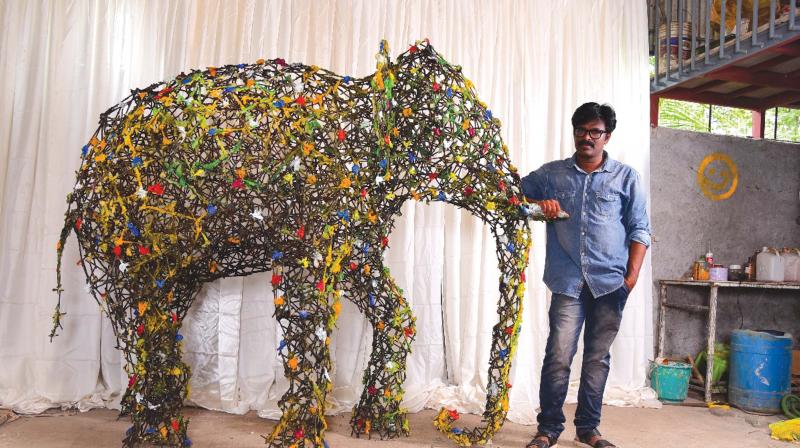Sculpted with love
The works of 10 Malayali artists will be presented at the Gaj Mahotsav to be held at Indira Gandhi National Centre for the Arts, New Delhi.

Forests and wild animals have played a crucial role in nurturing our creative and moral sides. We first encountered them in the form of stories and rhymes. They were instrumental in imparting life lessons to us. As children, we even believed that a tiny ant could teach a giant elephant a great lesson. As we grew up, our ideas about the mammal too widened. Not just in stories, we found elephants in almost every sphere of our lives, in different forms. We saw them being tortured and humans encroaching on their habitat, eventually resulting in ‘human-elephant conflicts’.
That indicates it’s high time we pay heed to the trumpets of these mammals. It’s time we talk about their habitat, lifestyle, emotions and moreover, their significance in our ecosystem. And when it is done with a touch of creativity, the outcome would be better and deeper. Organised by Wildlife Trust of India in association with Ministry of Environment, Forest and Climate Change, United Nations Environment and International Fund for Animal Welfare, the upcoming exhibition Gaj Mahotsav to be held at Indira Gandhi National Centre for the Arts, New Delhi from August 12 to 15 intends to spread this awareness.
Curated by Dr Alka Pande, the exhibition stresses on the need to safeguard Asian elephants and give them their ‘Right of Passage’. It will feature 101 sculptures of elephants representing the identified 101 elephant corridors documented in India. Selected artists from across the nation are participating in it, and 10 among them are Malayalis.
Dinesh P.G., T.R. Udayakumar, Pramod Gopalakrishnan, Subash, Ajayan Kattungal, Vinu, Biju C. Bharathan, Satheesh, Sanu and Sooraj have sculpted various aspects of elephants using different material. “It is a great recognition that artists from Kerala are invited to be a part of this exhibition that will be travelling to various cities later,” says Dinesh, who coordinated with the artists here. A few of them share their experiences.
The artists were advised to focus on Asian elephants and make them colourful using shades that represent the state. “They also instructed us to use materials that could withstand all weather conditions. The project is really inspiring. To take part in such a mission is a blissful and unfeigned work for me as an artist. Also, it is a privilege to work with Dr Pande,” says Ajayan, who made an elephant using iron rods. He adds, “This art piece is made by welding small iron rods. The piece shows an elephant that is in a dilapidated condition. The rustic feel given to it represents the endangerment and inhumane treatment towards them through the years. On the other hand, the colours show hope and belief that we can bring by changing the current situation. The colours also represent their proud, independent and elegant nature. In Kerala culture, elephants play a significant role in religious functions, temples, cultural events, festivals etc and the colours also indicate that.”
Dinesh has taken the movement of the elephant herd for his work. “I have depicted a female elephant and child. If you observe the elephant herd, you could see that the calf walks in front of its mother because an elephant cannot turn its head,” he says.
In his statuette, both the mother and baby are painted in yellow and the mother pushes her baby. “Yellow is the colour of celebration and wealth and it is an integral part of our culture. Take the festival of Vishu, yellow is there,” says the award-winning artist who has been in the field for more than 25 years.
Ever wondered why elephants cross our highways? It’s because we built roads across its traditional migratory path. That is the inspiration behind Pramod Gopalakrishnan’s work titled Elephant Way. Made of iron steel rods and GI metal sheets, his work shows this national heritage animal’s journey of life. “They are the torchbearers. In a forest, elephants create paths and other animals just follow. Hence, the elephant in my work carries a forest inside it. Not just roads, even the ponds in the forests are formed by elephants. So, they lead us the way. When we block their path, we are obstructing nature’s movement and the whole ecosystem,” he explains.
T.R. Udayakumar has chosen the mythical and religious aspect of the animal. The body of his elephant statue mirrors the forest. It is colourful but chained. “Elephants carry God during temple festivals. But they are in chains. It is due to the greed of humans. Sometimes, we can see tears rolling down their eyes. Yes, they are struggling for justice and to escape from the greedy world around them,” he says.
A lot of such depictions can be found during the fest. Along with the display, there will be talks by eminent personalities on the same theme. And, let us hope that this artistic venture will be an eye-opener to many.
Sculpting protest
The trumpet of an elephant symbolises both captivity and defence. If you compare the features of an elephant with other creatures, you could find that elephant is very different from them — be it in structure or behaviour. So, human interference in an elephant’s life will affect the mammal’s existence. Through this sculpture made of metal and jute, I present a trumpeting elephant that protests actions of mankind.

